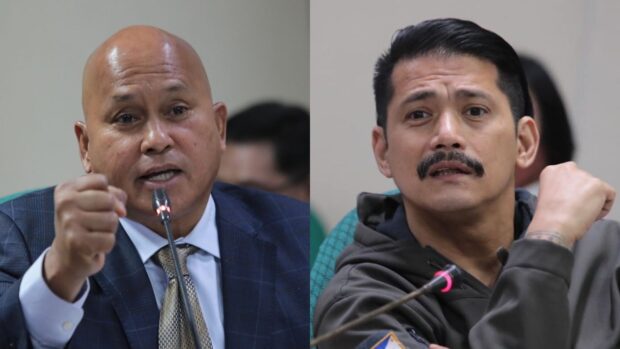
Senators Ronald dela Rosa and Robinhood Padilla (File photo from the Senate Public Relations and Information Bureau)
MANILA, Philippines — Two senators on Monday opposed the proposed collection of monthly pension premiums from active members of the military and other uniformed personnel (MUP), with Sen. Ronald dela Rosa reiterating that it could lead to the “collapse” of the country’s law enforcement and security sector.
Dela Rosa, a retired Philippine National Police chief, urged the government to conduct a thorough consultation before considering the plan of the Department of Finance (DOF) to require servicemen to contribute to their retirement fund.
A DOF-led technical working group (TWG) has proposed to mandate MUPs in active service to contribute 5 percent of their monthly pay for the first three years of the new plan.
New entrants to the state armed agencies, on the other hand, would be made to give 9 percent of their basic salary and longevity pay for the restructured pension system.
The TWG said the government would supplement the MUP contributions so that the monthly premium would total 21 percent—16 percent to those in the active service and 12 percent to the new entrants. This will bring their total monthly premium to the same level as all other state employees.
“Records show that the number of soldiers, policemen, and firefighters seeking early retirement has been increasing because of this impending move (by the DOF),” Dela Rosa told reporters.
“That’s really expected because many of them had already signified their intention to leave (the service ahead of their retirement),” he added.
Dela Rosa said he had been getting text messages from soldiers and policemen informing him that they were already preparing to file for early retirement.
The active state troopers, he noted, wanted to make sure that their pension benefits would be “safe” from the planned reforms in the MUP retirement system.
“There will be a mass exodus (of servicemen),” warned Dela Rosa, the chair of the Senate public order and dangerous drugs committee.
While he acknowledged the government’s fiscal predicament, Dela Rosa stressed that it was equally important to prioritize the welfare of state security agents.
“Between fiscal collapse and the weakening of national security and defense, and law enforcement due to the (possible) mass exodus (of MUPs), as lawmakers we must find a balance between the two,” he said.
Other fund sources
Sen. Robinhood Padilla also took issue with the DOF’s plan, insisting that the government should just look for other fund sources instead of passing on to the MUPs the burden of bankrolling their pension fund.
Unlike the Government Service Insurance System (GSIS) and the Social Security System (SSS), whose members partly pay for their retirement fund, the MUP pension is fully financed by the national government from the annual national budget.
As of 2020, the government’s unfunded obligations to the MUP pension fund have already reached P9.6 trillion, according to National Treasurer Rosalia de Leon.
“As of now, I’m really against (the DOF’s proposal),” Padilla said.
“Maybe if there will come a time when there are no more rebels in the country and our (MUPs) no longer lay their lives on the line every minute, then that’s the only time we abide with what (Budget Secretary Benjamin Diokno) is saying,” he added.
Diokno has been adamant in requiring mandatory contributions from uniformed personnel to avert a “fiscal collapse” of the pension system.
When told about President Ferdinand Marcos Jr.’s concern that the MUP pension fund would be depleted in the next six years, Padilla said it was up to the economic managers to find other solutions.
“Of course, we respect the President. But we need to be reminded that if we’re able to access other funds, it should not be this (contribution from MUPs),” he said.
As to Sen. Francis Escudero’s view that compelling servicemen to pay pension premiums was a “bitter pill to swallow,” Dela Rosa insisted that the government should give lawmakers and MUPs more time to study the proposal.
“What Malacañang wants is an instant solution to the problem,” he said. “But that should not be the case. We should give this more time. I don’t think there will be an immediate fiscal collapse.”
Consultations
The TWG has been holding consultation meetings with the different sectors to be affected by the proposed pension reforms.
The latest leg of the TWG’s roadshow, held on June 13, attracted 10,000 in-person and online participants from the Bureau of Jail Management and Penology.
Consultations over the previous several weeks involved personnel from the Armed Forces of the Philippines, the Philippine Air Force, the Presidential Security Group, and the PNP.
The TWG has lined up consultations with the AFP’s Health Service Command, Philippine Navy, Philippine Army, Visayas Command, Eastern Mindanao Command, Western Mindanao Command, Western Command, Philippine Military Academy, Northern Luzon Command, and Southern Luzon Command.
These would be followed by meetings with members of the Bureau of Fire Protection, the Philippine Coast Guard, the Bureau of Corrections, and the Philippine Public Safety College.
Diokno earlier said that based on data as of 2022, retired MUPs were receiving an average monthly pension of P40,049.
In comparison, the average monthly retirement pay is P13,000 for GSIS and P4,528 for SSS members.
Escudero earlier said that revisions in the MUP pension plan should have been done when then-President Rodrigo Duterte almost doubled the monthly salaries of soldiers in 2018.